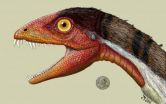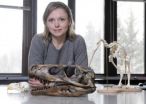Honey can reverse antibiotic resistance
2011-04-13
(Press-News.org) Manuka honey could be an efficient way to clear chronically infected wounds and could even help reverse bacterial resistance to antibiotics, according to research presented at the Society for General Microbiology's Spring Conference in Harrogate.
Professor Rose Cooper from the University of Wales Institute Cardiff is looking at how manuka honey interacts with three types of bacteria that commonly infest wounds: Pseudomonas aeruginosa, Group A Streptococci and Meticillin-resistant Staphylococcus aureus (MRSA). Her group has found that honey can interfere with the growth of these bacteria in a variety of ways and suggests that honey is an attractive option for the treatment of drug-resistant wound infections.
Honey has long been acknowledged for its antimicrobial properties. Traditional remedies containing honey were used in the topical treatment of wounds by diverse ancient civilisations. Manuka honey is derived from nectar collected by honey bees foraging on the manuka tree in New Zealand and is included in modern licensed wound-care products around the world. However, the antimicrobial properties of honey have not been fully exploited by modern medicine as its mechanisms of action are not yet known.
Professor Cooper's group is helping to solve this problem by investigating at a molecular level the ways in which manuka honey inhibits wound-infecting bacteria. "Our findings with streptococci and pseudomonads suggest that manuka honey can hamper the attachment of bacteria to tissues which is an essential step in the initiation of acute infections. Inhibiting attachment also blocks the formation of biofilms, which can protect bacteria from antibiotics and allow them to cause persistent infections," explained Professor Cooper. "Other work in our lab has shown that honey can make MRSA more sensitive to antibiotics such as oxacillin - effectively reversing antibiotic resistance. This indicates that existing antibiotics may be more effective against drug-resistant infections if used in combination with manuka honey."
This research may increase the clinical use of manuka honey as doctors are faced with the threat of diminishingly effective antimicrobial options. "We need innovative and effective ways of controlling wound infections that are unlikely to contribute to increased antimicrobial resistance. We have already demonstrated that manuka honey is not likely to select for honey-resistant bacteria," said Professor Cooper. At present, most antimicrobial interventions for patients are with systemic antibiotics. "The use of a topical agent to eradicate bacteria from wounds is potentially cheaper and may well improve antibiotic therapy in the future. This will help reduce the transmission of antibiotic-resistant bacteria from colonised wounds to susceptible patients."
INFORMATION: END
ELSE PRESS RELEASES FROM THIS DATE:
2011-04-13
ANN ARBOR, Mich. — Researchers at the University of Michigan Health System have uncovered a new link between genetic variations associated with alcoholism, impulsive behavior and a region of the brain involved in craving and anxiety.
The results, published online April 12 in Molecular Psychiatry, suggest that variations in the GABRA2 gene contribute to the risk of alcoholism by influencing impulsive behaviors, at least in part through a portion of the cerebral cortex known as the insula, says study senior author Margit Burmeister, Ph.D., research professor at U-M's Molecular ...
2011-04-13
On the off chance that any of my Wealth Counsel colleagues from warmer climes are unaware of conditions in the Midwest, southeast Michigan in mid-February is not full of sun and ripe for delightful outdoor activities (I've shocked you, I'm sure). Some people from our wonderful state enjoy all that our winters have to offer, including skiing, snowboarding and snowmobiling. Our law practice, however, has a significant number of retirement-age clients, and for those clients, and for the rest of us who prefer to reserve our outdoor recreation for the warmer months, February ...
2011-04-13
EDITOR'S PICK
Protein could improve recovery from heart attacks
Angiogenesis, the development of new blood vessels, is required during embryonic development and wound healing, as well as during disease processes such as tumor growth. The signals that direct angiogensis are incompletely understood, but could represent novel targets for the development of therapies that promote or inhibit this process.
In this paper, Young-Guen Kwon and colleagues, of Yonsei University in Seoul, Korea, investigated the role of two related proteins- DKK1 and DKK2- in angiogenesis. These ...
2011-04-13
A team of scientists led by the Smithsonian Institution has discovered a fossilized dinosaur skull and neck vertebrae that not only reveal a new species, but also an evolutionary link between two groups of dinosaurs. The new species, Daemonosaurus chauliodus, was discovered at Ghost Ranch, N.M. The team's findings are published in the Proceedings of the Royal Society B, Wednesday, April 13.
The oldest known dinosaurs walked or ran on their hind legs and included early predatory species such as Herrerasaurus. They existed in what are now Argentina and Brazil early in the ...
2011-04-13
This press release is available in French.
Pigeons may not instill the same aura of fear as a Tyrannosaurus rex, but they inherited their sense of smell from such prehistoric killers.
Birds are known more for their flying abilities and their senses of vision and balance than for their sense of smell. According to conventional wisdom, the sense of smell declined during the transition from dinosaurs to birds as the senses of vision and balance were improved for flight. But new research published today by scientists at the University of Calgary, the Royal Tyrrell Museum ...
2011-04-13
A simple dictionary search for the word mediation reveals the following definition: action in mediating between parties, as to effect an agreement or reconciliation. Legal practitioners are familiar with mediation as an alternative dispute resolution technique that utilizes a neutral party, the mediator, to assist two or more parties in coming to an out-of-court resolution to a dispute. Mediation is a common and effective technique that has long been used in general civil disputes, as well as in divorce and child custody matters. In fact, I first trained as a domestic relations ...
2011-04-13
Firm founder David Jasmer of The Jasmer Law Firm, located in Chicago, Illinois, recently secured a $1 million out-of-court settlement for a client who was rendered an incomplete quadriplegic following a fall down a defective stairway.
Last July, while visiting a friend's home, an active 54-year-old woman fell down a steep, poorly lit stairway onto a cement basement floor. She was catastrophically injured, breaking her neck and sustaining serious injuries to her spinal cord and knee. Doctors diagnosed her as an incomplete quadriplegic, meaning that she still had some ...
2011-04-13
There is growing inequality between different countries in Europe and central Asia in the proportion of people who die from stroke, according to a study published online today in the European Heart Journal [1].
In countries where the proportions of stroke deaths have been low at the end of the 20th century, the death rates are continuing to decrease sharply; these countries include most of the western European nations. But in countries where stroke deaths were moderate or high, there has been "a further unprecedented increase in this cause of death" say the authors of ...
2011-04-13
Blue denim jeans are one of the most popular and iconic fashion items in the world; now a study published in Biotechnology Journal reveals a cheaper, more efficient and eco-friendly method for treating dyed denim. The process of 'surface activation' used to wash-down the denim following dyeing could also offer an alternative to the dangerous, and internationally banned, sandblasting technique.
"The global production of denim is estimated at 3 billion linear meters and more than 4 billion garments per year," said Thomas Bechtold, from the Research Institute for Textile ...
2011-04-13
CINCINNATI—The hormone ghrelin, known to promote hunger and fat storage, has been found to enhance exploratory "sniffing" in both animals and humans.
The research, by University of Cincinnati (UC) scientists, suggests that ghrelin may be designed to boost detection of calories in our environment through smell and link those inputs with natural regulation of metabolism and body weight.
Led by Jenny Tong, MD, and Matthias Tschöp, MD, both of UC's endocrinology, diabetes and metabolism division, the study appears in the April 13, 2011, issue of The Journal of Neuroscience, ...
LAST 30 PRESS RELEASES:
[Press-News.org] Honey can reverse antibiotic resistance


